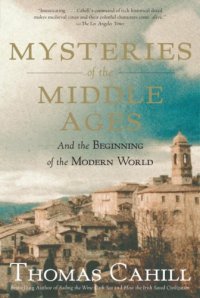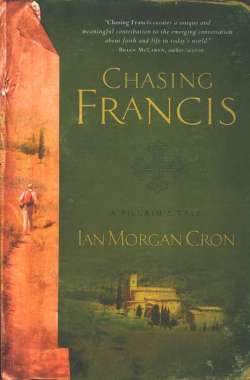 What are the ideas and people that changed classical mediterranean world into pre-modern Europe? How did the Romans become the Italians? These are the questions the Thomas Cahill tackles in his installment of his "Hinges of History" series, entitled "Mysteries of the Middle Ages". In this volume of his series he continues his modus operandi of inspecting the character and lives of the story-altering individuals that brought change into the time period investigated. This is not a geo-political, civilization-tracking history of the European basin through the middle-ages. Cahill intentionally skips much of the obvious historical weightlifting done by technical textbooks and goes right to the people of the narrative- and (of course) the narrative of those people.
What are the ideas and people that changed classical mediterranean world into pre-modern Europe? How did the Romans become the Italians? These are the questions the Thomas Cahill tackles in his installment of his "Hinges of History" series, entitled "Mysteries of the Middle Ages". In this volume of his series he continues his modus operandi of inspecting the character and lives of the story-altering individuals that brought change into the time period investigated. This is not a geo-political, civilization-tracking history of the European basin through the middle-ages. Cahill intentionally skips much of the obvious historical weightlifting done by technical textbooks and goes right to the people of the narrative- and (of course) the narrative of those people.
Cahill starts further back than I'd expect, and in fact pauses at classical foundations to review the Greeks before covering the classical extension of that inheritance down through the Romans. From there, he begins in earnest with an extensive "introduction" that leads the reader through the characters of classical Roman society (from 4th century) all the way to the end of the 11th century where we are deposited into the "high middle-ages" with an investigation into the origins of the cult of the virgin.
The author pushes against the personalities of several historical figures to shake a sense of life into the ancient personalities for us. Philo is teaching Moses in a greek class, Gregory the Great is dining with the poor, Hildegarde is singing from the enclosed living coffin of her monastery, Franciss of Assisi is struggling with a smile on his face, Dante is fleeing from one earthly hell to another (all the while writing his "Divine Comedy") and many vile figures of history are put in their place by fictitious literary backhands from Cahill. Each character is exposed for the good (or evil) that Cahill sees in them. Most are generous where deserved, but some are treated with such excessive ferocity, we see in the author a bit of the resentment presented by those who just can't stand anyone disagreeing with them.
One example is Cahill's blistering repartee of Bernard of Clairvaux. Like many high-profile eccentrics, Bernard does have a mixed contribution of greatness. His books on love remains some of the most articulate volumes ever written on the subject (I reviewed a selection volume of Bernard's works here). However, he also had faults including supported a crusade and being painfully dogmatic in defending the church against opposing views (to the point of using political and positional force to make his opinion win). Seen on the whole, Bernard seems human, but not monstrous. However, through Cahill, we see a darkly vengeful and impetuous Bernard. And the author does this with a couple figures in the book- vilifying their dark side without giving due credit to their positive contributions.
The book serves as a sort of "who's my favorite characters" narrative by the author (or worse depending on the subject at the time), but it's also obvious that Cahill chooses the stream of intellectual and philosophical personas over the political and high-labeled historical figures. What the author is doing is exploring how the ancient world died culturally and intellectually (if not in many other ways), contracted and eventually gave way to the European renaissance. The "movers and shakers" on Cahill's list are the poignant women and men (and their pivotal ideas) who propelled feminism, science and art out from under the gloom of a disintegrated western world in which the road of Romanitas had eventually taken civilization over a cliff.
While he treats Bernard conspicuously, the author saves copious praise for some of the truly great (and celebrated) figures, especially Hildegarde, Eleanor of Aquataine (queen of both France and England at times, mother of Richard the Lionhearted), Francis of Assisi (and Claire), Abelard, Thomas Aquinas (the brilliant scholastic), Giotto di Bondone (the foundational Italian painter/artist/architect), and Dante Alighieri (the famed poet/writer of "The Divine Comedy").
"Mysteries of the Middle Ages" weaves the stories of these characters, their significant lives, the triumph's (and failures) and how they left an enduring contribution to the culture, thought and science of Western Civilization. The author lucidly connects the narratives through a chronological map, even going so far as to transition from Giotto to Dante by having them meet. This is Cahill at his best, exploring what did, and what could have happened, all the while making the important points thread through history as though they were meant to find us now. You feel a providence in the grand narratives that Cahill writes (even from book to book) and his affirmation of faith is never kept shyly away. Still, the book is hardly an endorsement of Christiainity, and certainly not an empty-eyed smile to the Catholic church.
Cahill rails against every injustice that creeps its way into the clerical realm, unjustly at times, since he has the benefit of hindsight to beat his historical whipping boys with when they step out of line. But one has to give an acknowledgement of realism to the author for taking the current church to task (all the while not disowning it from his personal faith) for its abysmal failure in the modern scandal of sins of clergy sexual abuse amongst Catholic priests and the children given to their care. It is out of this angst from Cahill that there are a few R-rated moments in this book, when his rage boils over the top and he throws a good chunk of established Catholic church leadership and clergy over the perverbial cliff.
I ended up reading this book two full times and a third time reskimming it again. It is almost as much a story as "How The Irish Saved Civilization", though focusing on a good many more characters. It is less historical, geo-political or national than "Sailing the Wine-Dark Sea" or "The Gifts of the Jews", but this is clear and repeatedly warned. Overall, it is a vivid and brilliant picture of Cahill's post-classical, pre-rennassaince Europe. It is especially engaging and enjoyable if you know the historical context and chronology before you read this book. Reading this book will make you live through the hidden secrets of the middle-ages rather than recite the historical headlines.
Amazon Book Link: http://amzn.to/SRdMBR
Review by Kim Gentes
 cahill,
cahill,  dante,
dante,  europe,
europe,  florence,
florence,  giotto,
giotto,  history,
history,  italy,
italy,  latin,
latin,  middle ages,
middle ages,  rome,
rome,  saint francis,
saint francis,  thomas cahill in
thomas cahill in  Art,
Art,  Church,
Church,  Community,
Community,  Geopolitical,
Geopolitical,  History,
History,  Leadership,
Leadership,  Linguistics,
Linguistics,  Literature,
Literature,  Resource,
Resource,  Science,
Science,  Society,
Society,  Technology
Technology 
